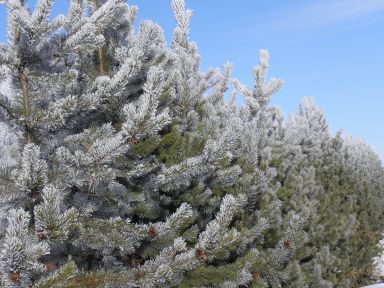Wild About Flowers
Pinus contorta - Lodgepole Pine
Pinus contorta - Lodgepole Pine
Couldn't load pickup availability
Lodgepole Pine is a hardy, fast-growing conifer that thrives in diverse landscapes, and reaching 50-100 feet tall. Its tall, slender form and dense evergreen needles make it an excellent choice for windbreaks, reforestation projects, and self-sustaining landscapes. It produces pollen-rich male cones, providing a resource for native bees and early-season insects, while its seeds feed red squirrels, crossbills, and other songbirds. A valuable addition to large-scale restoration efforts, rural plantings, and naturalized urban spaces, it excels where a strong, adaptable tree is needed.
Lodgepole Pine grows in dry forests, open meadows, and mountainous slopes, often thriving in nutrient-poor soils where other trees struggle. As a pioneer species, it readily colonizes burned or disturbed areas, playing a key role in forest regeneration. Young trees may be browsed by deer, but mature trees are generally avoided, giving it moderate grazing resistance.
Bloom Times & Plant Sizes
Bloom Times & Plant Sizes
Important Information - The "Bloom Period" is an indicator of the time period within which the wildflowers will bloom and does not describe the time period that a single plant will bloom. The "Sizes" listed are intended to be a general guideline to consult during plant selection. - Plant growth and bloom times will vary depending on geographical location & individual site conditions.
Edible & Medicinal Info Disclaimer
Edible & Medicinal Info Disclaimer
The Edible & Medicinal information on this site is for informational purposes only and should not be acted on without thorough research and professional guidance. We are not responsible for any adverse effects resulting from the use of or misidentification of plants.
Share

Plant Specifics
Seeds Per Pack
Seeds Per Package: 15
Light Conditions
- Sun
Soil Conditions
- Well Drained
- Sandy
- Gravelly
Height
Width
Bloom Colour
Month of Bloom
Vigorousness
- Moderate
- Fast
Deer Resistance
- Moderate
Features
- Birds
- Bees
- Fragrant
- Attractive Seed Heads
- Rural Spaces
- Medicinal Properties
- Edible Parts
Chinook Exposure
- Fully Exposed
Distribution Info
Native to BC, AB, SK, MB, YT, and NT, extending into the western U.S., having the largest distribution of any North American pine species. Common in boreal forests, montane regions, and coastal areas, thriving in poor, rocky, or fire-prone environments.
Traditional Edible & Medicinal Info
Indigenous groups widely used Pinus contorta for structural, medicinal, and food purposes. Its straight, flexible trunks were the primary wood for Tipi poles, while resin and needle infusions were used to treat respiratory ailments, sore throats, and muscle pain. The seeds were occasionally consumed as a food source.

